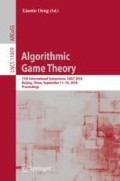Abstract
We study single-winner STV from the point of view of communication. First, we assume that voters give, in a single shot, their top-k alternatives; we define a version of STV that works for such votes, and we evaluate empirically the extent to which it approximates the standard STV rule. Second, we evaluate empirically the communication cost of the protocol for STV defined by Conitzer and Sandholm (2005) and some of its improvements.
This is a short version of our long paper submitted to SAGT 2018 (this submitted long version is available at https://goo.gl/Knd59d).
Access this chapter
Tax calculation will be finalised at checkout
Purchases are for personal use only
Notes
- 1.
For single-winner elections, STV is often called instant runoff voting.
- 2.
Jiang et al. [4] define a weaker version of necessary losers for STV in the context of a search algorithm for outputting all parallel universe STV winners.
References
Baumeister, D., Faliszewski, P., Lang, J., Rothe, J.: Campaigns for lazy voters: truncated ballots. In: Proceedings AAMAS, pp. 577–584 (2012)
Conitzer, V., Sandholm, T.: Communication complexity of common voting rules. In: Proceedings of the 6th ACM Conference on Electronic Commerce, pp. 78–87. ACM (2005)
Filmus, Y., Oren, J.: Efficient voting via the top-k elicitation scheme: a probabilistic approach. In: Proceedings of ACM Conference on Economics and Computation, pp. 295–312 (2014)
Jiang, C., Sikdar, S., Wang, J., Xia, L., Zhao, Z.: Practical algorithms for computing STV and other multi-round voting rules. In: EXPLORE-2017: The 4th Workshop on Exploring Beyond the Worst Case in Computational Social Choice (2017)
Mattei, N., Walsh, T.: PrefLib: a library for preferences http://www.preflib.org. In: Perny, P., Pirlot, M., Tsoukiàs, A. (eds.) ADT 2013. LNCS (LNAI), vol. 8176, pp. 259–270. Springer, Heidelberg (2013). https://doi.org/10.1007/978-3-642-41575-3_20
Naamani-Dery, L., Kalech, M., Rokach, L., Shapira, B.: Reducing preference elicitation in group decision making. Expert Syst. Appl. 61, 246–261 (2016)
Oren, J., Filmus, Y., Boutilier, C.: Efficient vote elicitation under candidate uncertainty. In: Proceedings of IJCAI, pp. 309–316. AAAI Press (2013)
Skowron, P., Faliszewski, P., Slinko, A.: Achieving fully proportional representation: approximability results. Artif. Intell. 222, 67–103 (2015)
Author information
Authors and Affiliations
Corresponding authors
Editor information
Editors and Affiliations
Rights and permissions
Copyright information
© 2018 Springer Nature Switzerland AG
About this paper
Cite this paper
Ayadi, M., Amor, N.B., Lang, J. (2018). The Communication Burden of Single Transferable Vote, in Practice. In: Deng, X. (eds) Algorithmic Game Theory. SAGT 2018. Lecture Notes in Computer Science(), vol 11059. Springer, Cham. https://doi.org/10.1007/978-3-319-99660-8_23
Download citation
DOI: https://doi.org/10.1007/978-3-319-99660-8_23
Published:
Publisher Name: Springer, Cham
Print ISBN: 978-3-319-99659-2
Online ISBN: 978-3-319-99660-8
eBook Packages: Computer ScienceComputer Science (R0)

